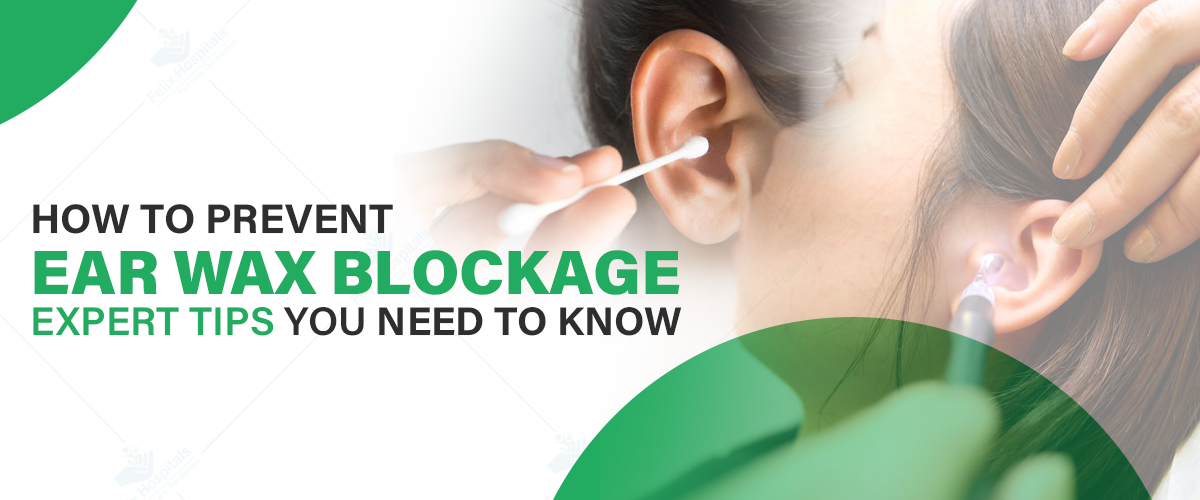
Subscribe to our

Maintaining ear health is essential for overall well-being, and earwax plays a crucial role in protecting your ears. However, excessive earwax buildup can lead to blockages, causing discomfort, hearing issues, and even infections. Understanding how to prevent earwax blockage is key to ensuring your ears remain clean and healthy. If you’re searching for the best hospital for ear wax blockage treatment, here’s everything you need to know.
Contact Felix Hospital today by calling +91 9667064100 for expert guidance and to book your consultation in Noida Sector 137 or Greater Noida Gamma 1.
Earwax, or cerumen, is a natural secretion made by glands in the ear canal. It’s composed of dead skin cells, secretions, and hair, forming a protective barrier to:
Earwax blockage may seem like a minor inconvenience, but it can lead to significant discomfort and even disrupt your daily life. Recognizing the signs early on can help you seek timely treatment and prevent complications. Here are the most common signs and symptoms:
Prompt diagnosis and treatment by a specialist at the best hospital for ear wax blockage treatment can alleviate these symptoms effectively, restoring your ear health and overall well-being.
Preventing earwax buildup is easier than treating a blockage. By adopting safe ear hygiene practices and avoiding harmful habits, you can maintain clean and healthy ears. Here are some expert-recommended tips:
By following these preventive measures, you can minimize the risk of earwax blockages and keep your ears healthy.
Misconceptions about earwax and ear care are widespread, often leading to harmful practices. Let’s debunk some of the most common myths:
Myth 1: Earwax Indicates Poor Hygiene
Fact: Earwax is a natural secretion that plays an essential role in protecting your ears. It traps dust, debris, and bacteria, preventing them from reaching the eardrum. Its presence is not a sign of uncleanliness but rather a healthy function of the body.
Myth 2: Frequent Cleaning is Necessary
Fact: Cleaning your ears excessively can remove the protective layer of earwax and irritate the ear canal, increasing the risk of infections. Most people don’t need to clean their ear canals regularly, as the wax naturally migrates outward.
Myth 3: DIY Removal Methods are Safe
Fact: Inserting objects like cotton swabs, candles, or sharp tools into the ear canal can damage the eardrum or push wax deeper, causing blockages or even permanent hearing loss. For safe removal, it’s best to consult a professional at the best hospital for ear wax blockage treatment.
Understanding the facts about earwax can help you make informed decisions about your ear care and avoid potentially harmful practices.
If earwax buildup is causing you discomfort, it’s time to consult an ENT specialist. Felix Hospital, located in Noida Sector 137 and Greater Noida Gamma 1, is renowned for its expertise in earwax management. With a team of the best doctors for ear wax blockage treatment, you’ll receive personalized care and advanced treatment options tailored to your needs.
Meet Our Expert ENT Specialists
At Felix Hospital, we provide:
Our state-of-the-art facilities and patient-first approach make us the best hospital for ear wax blockage treatment in Noida and Greater Noida.
Schedule a consultation with the best ENT surgeon at Felix Hospitals for earwax blockage.
Earwax plays a vital role in protecting your ears, but excessive buildup can lead to blockages and discomfort. By adopting preventive measures such as avoiding cotton swabs, keeping your ears dry, and practicing gentle hygiene, you can maintain healthy ears and reduce the risk of blockages.
If you’re experiencing symptoms of earwax buildup, don’t wait—consult an ENT specialist at Felix Hospital. With experienced doctors, advanced facilities, and a focus on patient care, Felix Hospital offers the best solutions for earwax management at an affordable ear wax blockage treatment cost.
Q- How can I tell if my hearing issues are due to earwax blockage and not another condition?
Ans- If your hearing loss is sudden, partial, or accompanied by a feeling of fullness or pressure in the ear, it may indicate earwax blockage. Tinnitus, dizziness, or ear pain could also signal buildup. A consultation with an ENT specialist is recommended for a proper diagnosis.
Q- Are earwax-softening drops safe for everyone?
Ans- Earwax-softening drops are generally safe, but they may not be suitable for individuals with a history of ear infections, perforated eardrums, or recent ear surgery. Consult an ENT specialist before using these drops, especially if you experience ear pain or discharge.
Q- Can using hearing aids increase my chances of developing earwax blockage?
Ans- Yes, hearing aids and earbuds can trap earwax inside the canal, leading to buildup over time. Regularly cleaning your devices and scheduling routine ear examinations can help mitigate this risk.
Q- What should I do if water enters my ears during swimming or bathing?
Ans- Gently dry your ears with a soft towel and tilt your head to help water drain out naturally. Avoid inserting objects like cotton swabs to remove water, as they can push wax deeper into the canal. For recurring moisture issues, consider using earplugs while swimming.
Q- How does Felix Hospital ensure safe earwax removal procedures?
Ans- At Felix Hospital, ENT specialists use advanced tools and techniques such as microsuction, irrigation, or manual removal to safely extract earwax without damaging the ear canal or eardrum. The procedure is tailored to your specific needs for maximum safety and comfort.
Q- When should I consult a specialist instead of trying home remedies for earwax removal?
Ans- You should consult a specialist if you experience persistent hearing loss, pain, tinnitus, dizziness, or discharge from the ear. Avoid home remedies if you have a perforated eardrum, a history of ear infections, or if initial attempts to remove wax have been unsuccessful.